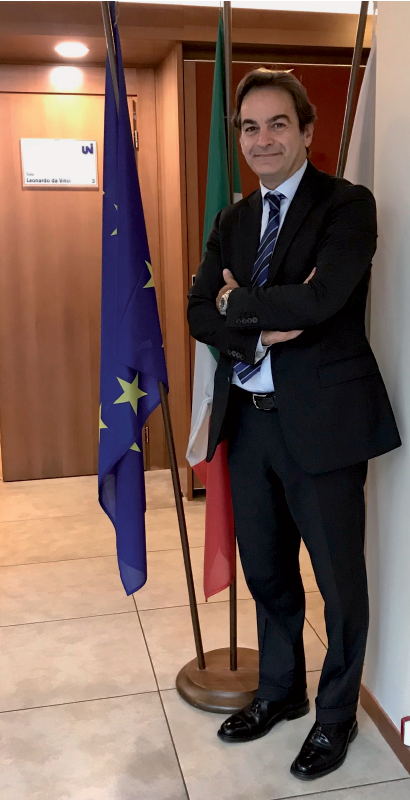ISO/TC 313 Packaging machinery: work in progress
Overcoming the sectorial conflicts between European and American standards or those of other countries regarding the standardization of packaging machines and systems: this the task entrusted to the international working group under Italian presidency, tasked with developing unique rules on the subject, that are valid worldwide. Opinions and impressions from the first plenary meeting, which took place in Milan on October 10. L.G
Before broaching the subject of the contents that emerged from the meeting, the following premise is required.
Last April, the ISO - International Organization for Standardization, in fact created the ISO/TC 313 Packaging Machinery Group, approving a request presented by Italy (wanted and proposed by UCIMA, Ed.) in merito alla for the creation of a new international working group, to be entrusted with the task of developing a series of rulings for the standardization of packaging machines and systems, with particular reference to safety, terminology, classification, design, efficiency and availability.
Underlying the “operational” task, is the intent to “find a common language” to reduce potential disputes, improve the transparency of negotiations and, ultimately, share economic benefits thanks to the removal of obstacles.
But what are the major problems for companies producing packaging technology that export to foreign markets? Indeed the most difficult obstacles to overcome are precisely associated with the quantity of non uniform technical rules, the presence of many national certifications and, last but not least, to the customer’s corporate norms and standards, often different from each other.
This does not enable homogeneous planning and leads to the strong penalization of some machine builders, forced into an excessive effort to adapt to the multiplicity of technical standards.
The working group will try to find a solution to all these problems by proposing univocal international standards, which will not only enable the raising of the quality standards but will also favour both the customer companies as well as packaging machine manufacturers.
 October impressions
October impressions
To commence the process of studying these sensitive topics, the group hence agreed to meet in Milan (at the headquarters of the Italian National Unification Body - UNI).
The encounter was hosted by Andrea Malagoli (member of the majority shareholder family of the Ima Group, of which he is Managing Director, as well as Ucima Vice-President), who provided us with a first assessment of the climate of the initial kick-off meeting.
«First of all we have to register the keen interest in this initiative: This is demonstrated - Malagoli speciffies -by the number of participants at the encounter, starting with an important US presence, a fundamental market for our sector and which, from a technical point of view, has very different rules from the European ones.
But in addition to the 15 effective members representing the various standardization bodies of the individual States that formally adhered to the proceedings of the ISO/TC 313 Packaging Machinery Group, we also welcomed observers delegations from Japan and France: this a sign of the need felt at all levels and to which a solution needs to be found».
First step: safety
The need is to establish and share future strategies, identify the issues to which priorities should be assigned in the regulatory work, in order to develop targeted working groups: «Also thanks to the positive climate, the agenda of the first meeting was respected», observes the president, who states: «Today we made operational decisions for the coming year: we have in fact defined the creation of a working group that will develop a general standard for the safety of packaging machines; it will be an ISO standard but it will have to be harmonized with the Machinery Directive (therefore not only ISO, but also EN).
And although the world of standardization and technical standards is by its very nature “non-binding”, the fact remains that the approved technical contents will inevitably become the state of the art of the sector, and hence a fundamental benchmark for defining the technical characteristics of the supply of packaging machines. If we then consider that many user companies are multinationals that fully apply the sector’s international standards, one can well understand the level of interest for the new legislation».
Alongside the meeting Andrea Malagoli lastly expressed full confidence in the ability to solve the problems that might arise along the way. «I don’t think it will be a matter of technical problems, but rather more problems of a general definition and view of the regulatory approach.
In fact, Americans and Europeans have a certain diversity, given that we come from schools of thought that have traveled separately until now.
Our way of presenting data is not yet homogeneous and this could create some difficulties in the development of standard; but thanks to the definition of a globally shared and comprehensible common language, everyone will be able to read the data in the same way, so as to facilitate exchanges and increase the possibilities for interaction.
The aim is therefore to find points of encounter on this terrain.
Indeed, we all share the same objectives, that is to make the machines safer for users and avoid legal disputes, which can greatly affect the competitiveness of manufacturers this also in terms of exports».
GROUP VOICES
Europeans on the one hand, Americans on the other, still have a long work ahead of them, that needs to be pursued with determination and with political savoir-faire in order to soften existing differences and find grounds for assonance in the name of safety.
«In actual fact - stated Fred Hayes, American and PMMI Technical Director - the first question we have to ask is how can we make European and American regulations coexist, for the benefit of companies that buy and use machinery, so that their workers are safer. The objective, therefore, is not so much to satisfy the legal requirements, but to build safe machines for the people who have to use them».
In consultation with the president, some delegates interviewed expressed a decidedly positive opinion on the possibility of raising European standards to ISO level.
«Even though EU standards, for example in terms of safety, hygiene and energy consumption, are by now a well-established reality - says Robert Höge (Bereichleiter, Multivac Corporate Quality Manager and head of the German delegation) - manufacturers will have the opportunity to present machines designed according to unquestionable international standards, with undoubted advantages for the users themselves».
The Swiss Gianni Cordasco (Head of Tools/Seals and Signode Product Manager) warns that now «the time is ripe to bring the rules to a higher level, because the global market requires it. And Europe, in this sense, has a lot to say on the matter».

















